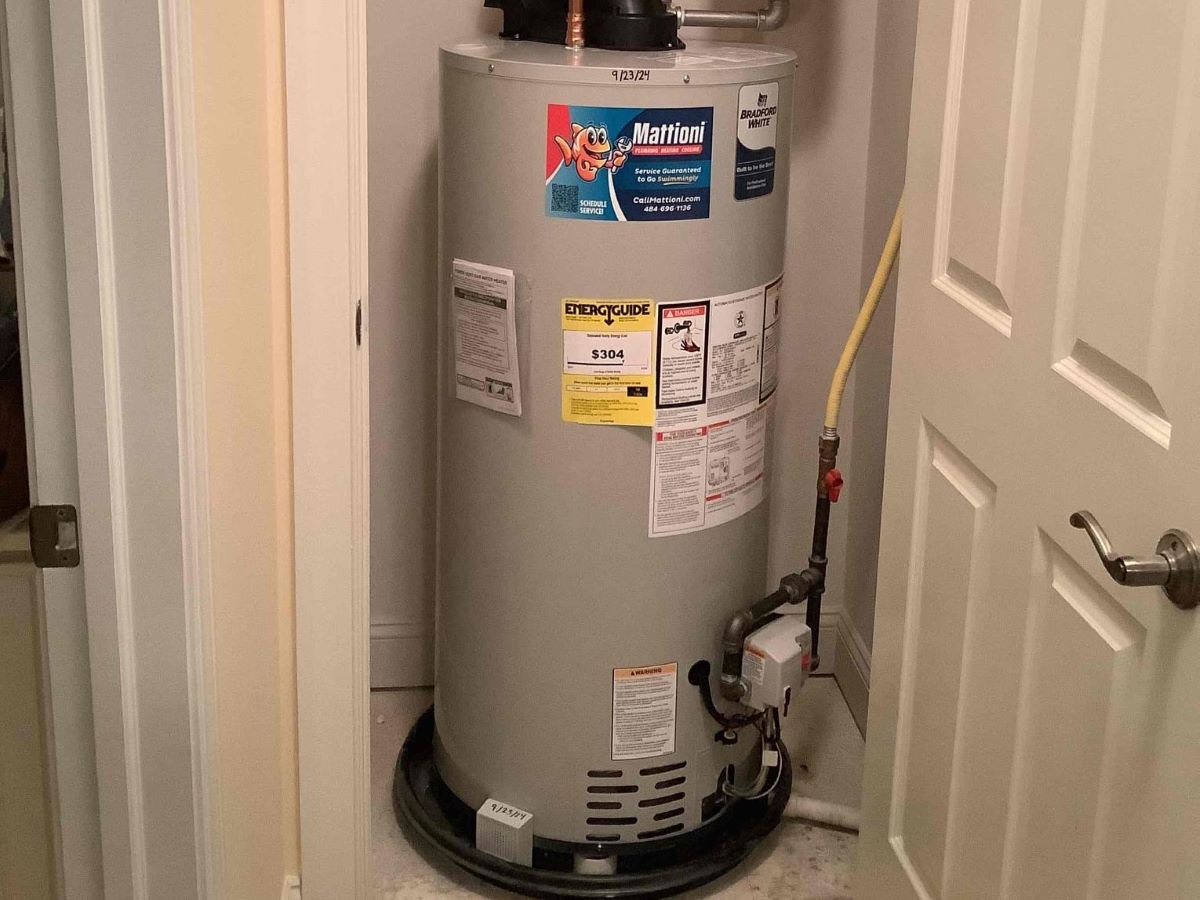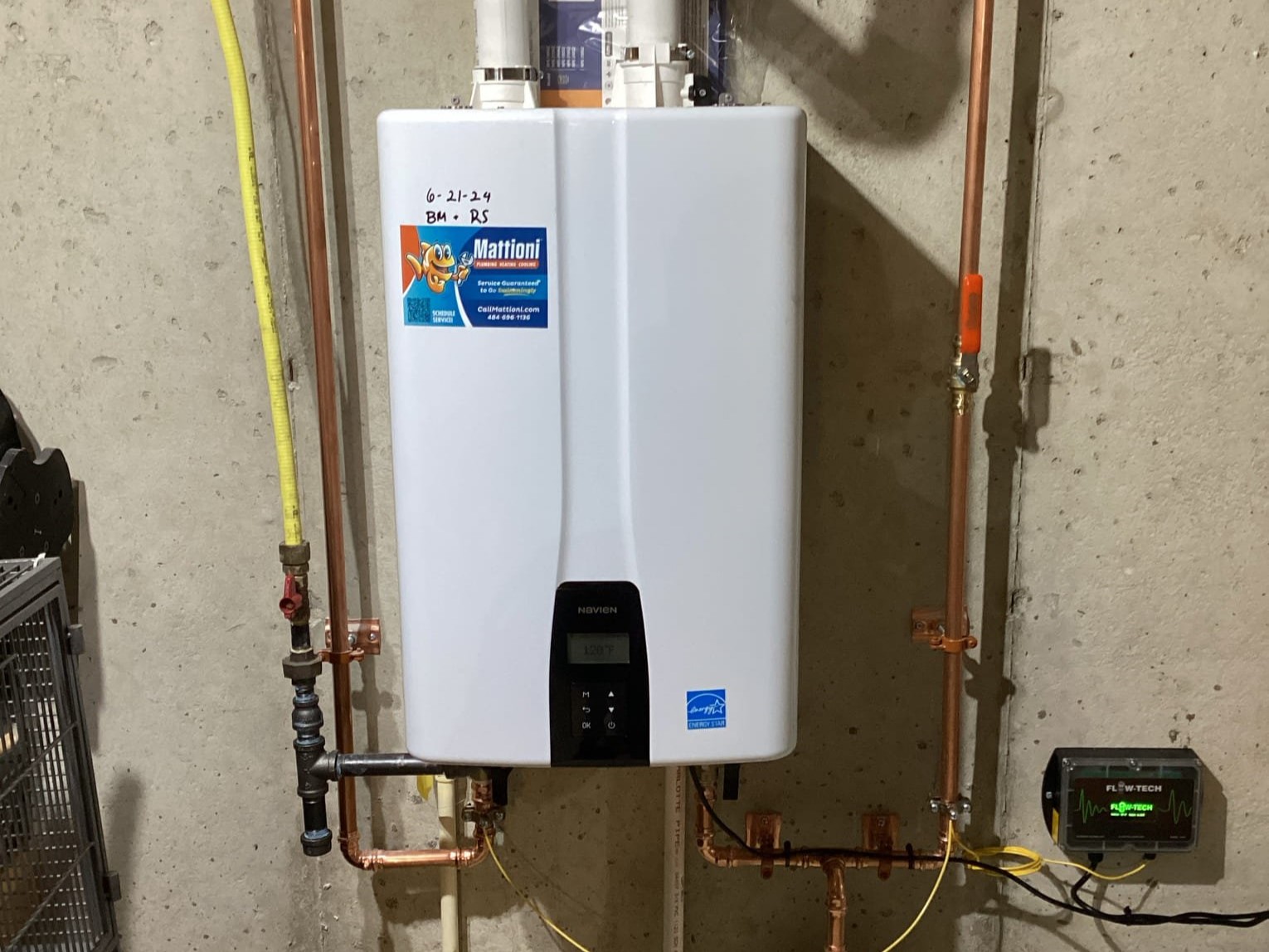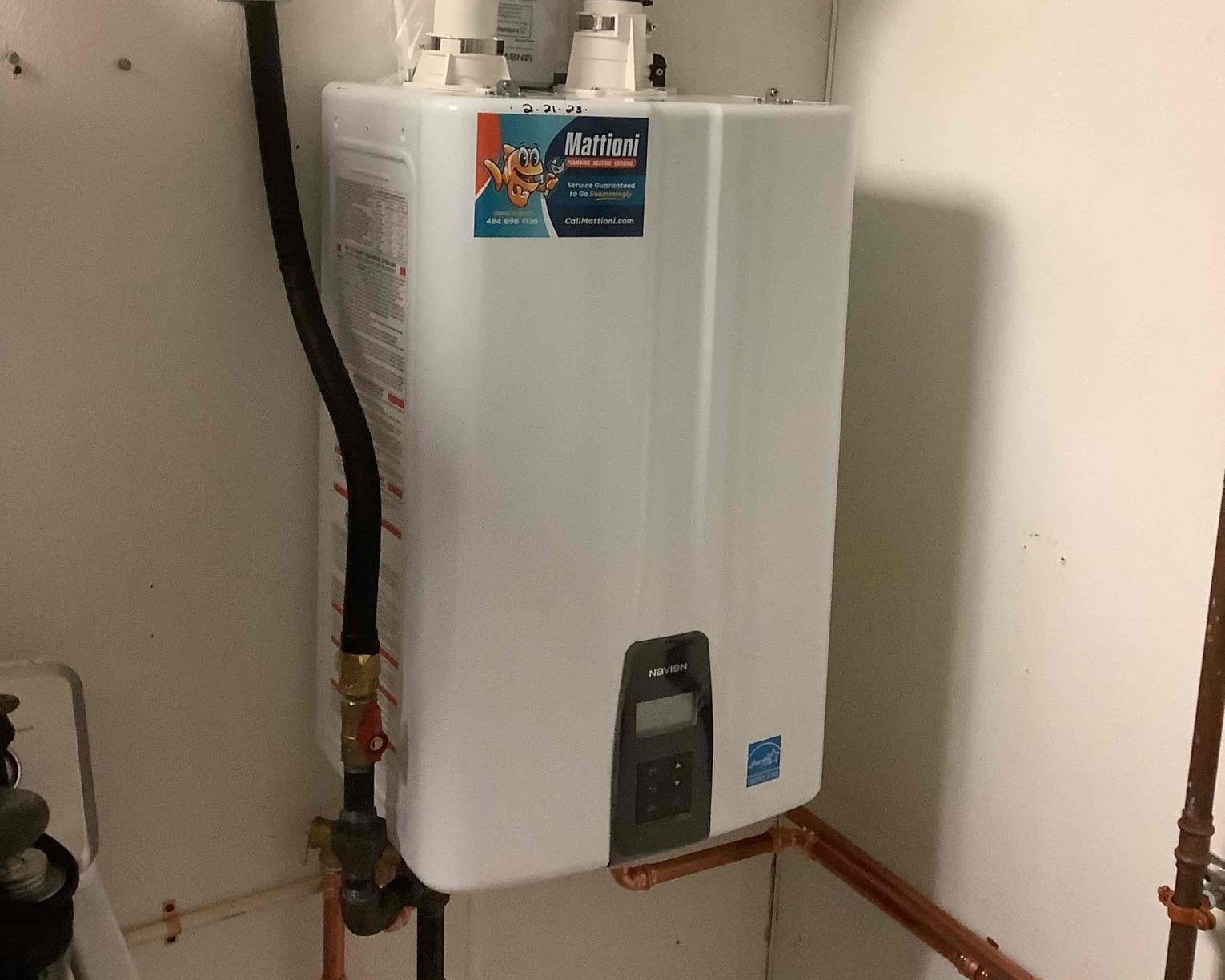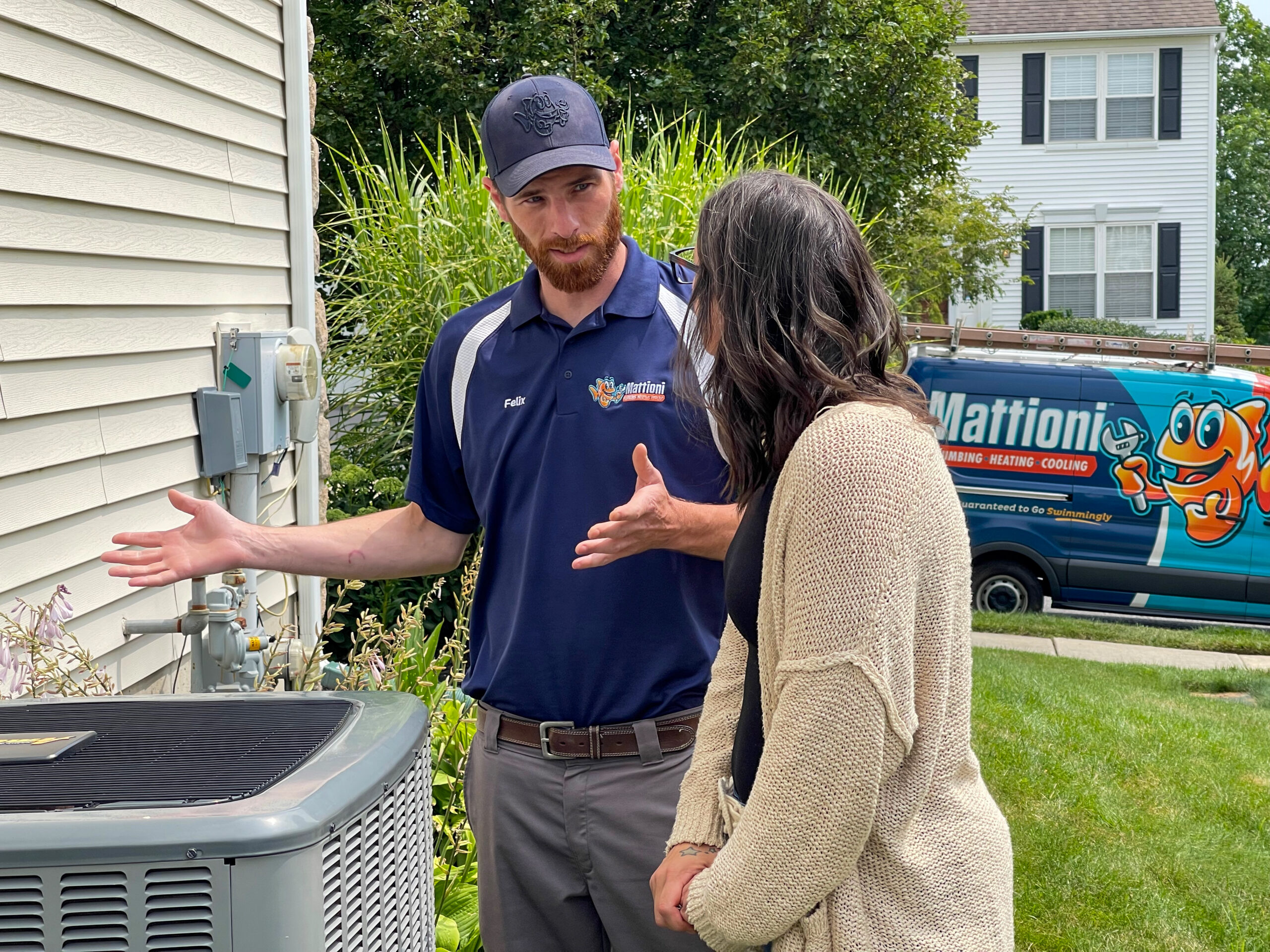|
Getting your Trinity Audio player ready...
|
Last Revised: 12/19/2024
Are you comparing water heater replacement options and how each type delivers hot water? Are you concerned about costs, energy efficiency, and finding the right fit for the space in your home?
With so many options and opinions, it’s easy to feel overwhelmed when trying to make the right choice for your home. Choosing between traditional steel tank water heaters and tankless systems isn’t just about whether you want a storage tank or not. It’s about your home’s hot water demands, energy efficiency, upfront installation costs, and system longevity expectations.
You may have already heard that tank-type water heaters are the traditional option, while tankless water heaters are the modern choice. But what does that really mean for your household?
In this article, we’ll help you cut through the noise by exploring the advantages and disadvantages of each system. You’ll gain a clearer understanding of which water heater aligns with your needs, your budget, and your home’s needs.
Whether you’re upgrading from an old unit or installing a system into a new home, reading this article will empower you to make a confident and informed decision.
Let’s get started by looking at the perks of traditional tank water heaters.

Traditional Tank Water Heater Pros: Costs, Simplicity & Reliability
Steel tank water heaters operate by storing a fixed amount of hot water (typically 50 to 80 gallons) in a large, insulated tank. The water is continuously heated to maintain a set temperature. These systems are still the most popular option in homes today.
1. Lower Upfront Costs
If short-term budgeting is one of your top priorities, then you may want to look closely at tank-type water heaters. Traditional tank water heaters are more affordable to purchase and install than their tankless counterparts, making them an appealing option for those looking for a cost-effective solution, or replacing systems on short notice.
Their simple design also translates to fewer installation complexities, further reducing upfront costs. Tank water heaters are a budget-friendly investment that’ll support your home’s hot water demands for roughly the next 10 years.
2. Compatible with any Fuel Source
Traditional tank water heaters are versatile in the fuel source that their heating elements are compatible with. Whether your home is set up with natural gas, propane, oil, or electricity, a tank water heater will be easily hooked up. This versatility creates some flexibility for you to choose how you’d like to heat your home, making it a viable choice for nearly any home.
Tank water heaters free you up to make a fuel choice based on your home’s current facilities and your long-term utility goals.
3. Simple Operation
The design and functionality of tank water heaters are straightforward and reliable. They require little in the way of advanced controls or settings, what makes them easy to use and troubleshoot.
Hot water stays right in the storage tank, where it’s ready to go at a moment’s notice. They require less specialized knowledge to understand, so if you need a no-fuss appliance then tank water heaters are a good choice.
4. Lower Repair Costs
Tank-type water heaters typically encounter lower repair costs, largely due to their simple operation. They have fewer electrical components and aren’t as complex as tankless systems, so maintenance and repair services are relatively inexpensive and available from nearly all plumbing companies.
Traditional Tank Water Heater Cons: Limited Efficiency & Hot Water Supply
1. Higher Energy Costs
One of the biggest drawbacks of tank water heaters is the continuous energy consumption required to keep water heated and ready in the tank even when you’re not using it. The energy used to keep water hot is called “standby losses” and results in higher utility bills over time.
Traditional tank-type water heaters are less efficient than tankless systems.
2. Limited Hot Water Supply
With a tank system, the amount of hot water you can use at one time is limited to its size. Once the tank is depleted, you’ll need to wait for it to refill and reheat, which can be inconvenient for larger households during peak usage times.
Sometimes this results in colder showers once the tank has used over 70% of its hot water – something that doesn’t happen with tankless water heaters.
3. Takes up More Space
For many homes, it’s worth considering the spatial footprint of your water heater. Traditional tank water heaters can require a sizable installation area, potentially making them an inconvenience in smaller homes, condos and apartments.
The space that your water heater takes up could potentially be used for storage, which would free up more space in the rest of your home.
4. Shorter Lifespan
After about 10 years of operation, corrosion and sediment buildup may force your to start thinking about replacing a tank-type water heater. Following an annual maintenance schedule and routinely flushing the system can potentially help sustain performance and efficiency for another 5 years, however this falls short of the expected longevity of a tankless water heater.

Tankless Water Heater Pros: Efficiency, Space-Saving, and Endless Supply
Tankless water heaters, sometimes known as on-demand water heaters, heat water only when you turn on the tap. They don’t store water in a tank but instead use high-powered burners to rapidly heat water as it flows through the system.
1. Lower Energy Costs
Tankless systems are the more modern option, offering heightened efficiency due to their on-demand design. This is a direct result of avoiding standby losses that are experienced by traditional tank-type water heaters.
Over the life of the unit, the savings on utility bills can really add up and offset the higher initial investment.
2. Unlimited Hot Water
Tankless water heaters don’t rely on stored water but rather heat water on demand. A properly sized tankless system can deliver a continuous supply of hot water – even during moments of high demand.
This is the hallmark feature of tankless water heaters and makes them ideal for households with many occupants or multiple bathrooms.
3. Takes Up Less Space
Tankless water heaters are compact (roughly the size of a small suitcase) and wall-mounted, saving valuable floor space. This extra room can be invaluable in homes with limited square footage, freeing up space to be used for storage.
Tankless systems help you get the most out of your space and potentially create a better-organized home.
4. Longer Lifespan
With proper maintenance, tankless systems can last over 20 years, further increasing their value compared to traditional tank water heaters. This durability makes them a good long-term investment for homeowners looking to avoid frequent delays.
Tankless Water Heater Cons: Higher Costs & Fuel Requirements
1. Higher Upfront Costs
Tankless water heaters are more expensive to purchase and install than tank models. Moreover, it may be necessary to convert your home to natural gas or propane, which could further increase upfront costs.
You’ll see immediate cost savings on your utility bills, but it could take a few years for those savings to completely pay off the installation costs.
2. Hard Water Sensitivity: Must be Flushed Annually
All water heaters require regular maintenance, however tankless systems experience larger performance and efficiency drops if they aren’t serviced every 12 months, especially if you have hard water. Mineral buildup can impact the heating element and valves, damaging the quality of your home’s hot water supply.
Of course, if you follow a regular maintenance schedule with a professional plumber, tankless water heaters will maintain their higher levels of performance and efficiency.
Being proactive and scheduling maintenance appointments for your tankless water heater ahead of time will help not only preserve its performance and efficiency but also maximize its lifespan. If your home has hard water, then you may want to learn about how a water softener can protect your water heater, and the rest of your plumbing system.
3. Higher Repair Costs
By now, you should understand that the functionality of tankless units is superior to that of traditional tank models. This brings many unique benefits, but it also brings higher repair costs.
Since tankless units have more sophisticated electrical components than other systems, you may end up paying more to patch yours up down the road. Think of tankless systems like luxury cars: they have a lot more to offer than some other models, but the mechanic will probably charge more than they would for the average sedan.
Consider scheduling maintenance appointments regularly with a VIP membership in order to reduce the likelihood of any larger issues that could require a costly repair.
4. Requires Natural Gas or Propane Access
While many homes may already have the infrastructure in place to facilitate natural gas or propane, others may need to convert to one of these fuels when installing a tankless water heater. Natural gas and propane are two of the most efficient fuels, however conversion costs could be significant.
If you already utilize natural gas or propane for your hot water or heating system, however, this drawback doesn’t apply. Be sure to have a thorough conversation with your plumbing pro about the drawbacks to converting fuel sources, as well as the long-term benefits.
Which Water Heater is Right for You?
Ultimately, the type of water heater that’s right for you will depend on your household’s hot water needs, your short-term budget, and long-term goals.
If you’re looking for something affordable and straightforward with manageable repair costs, tank-type water heaters remain a tried-and-true choice. If you value lower monthly bills, never-ending hot showers, system longevity, and a compact design, then a tankless water heater might make sense for you.
There’s no one-size-fits-all answer, so if you’re still not sure which water heater is right for you, don’t hesitate to speak with a professional plumber, or check out these additional resources:

Next Steps in Your Water Heater Installation
Now that you have a strong understanding of the benefits and drawbacks of both tank and tankless water heaters you’re equipped to make some decisions.
Once you’ve made a final call on the type of water heater that best suits your needs, it’s time to take action. To ensure that the installation process goes smoothly, be careful as you choose a plumbing company for the job.
The right professional will ensure that your water heater is hooked up properly, setting it up for optimal efficiency and reliability for years to come. Moreover, working with the right plumbing company will also mean you have easy access to ongoing maintenance and repair services.
Be sure to ask whichever company you choose about VIP memberships and the significance of routine tune-ups throughout the life of your water heater.
The team at Mattioni has extensive experience with both tank and tankless systems and offers expert advice to help you make the best choice for your home. If you still have doubts about the water heater you’re installing, our friendly staff can be reached at (610) 400-8510 to assist no matter where you’re at in your water heater replacement process. When you’re ready, you can also book a free in-home consultation directly online.
The right preparation now can save you headaches in the future – so be sure to explore all your options carefully and choose a trustworthy plumbing company for your water heater installation.




